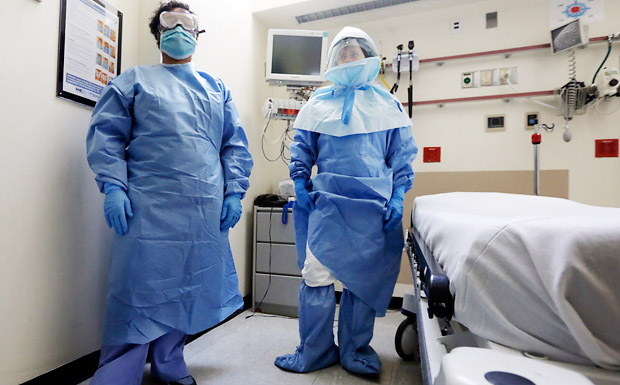
Gov. Rick Perry held a press conference to announce the plan Tuesday at UT Southwestern Medical Center. (Michael Ainsworth/Staff Photographer)
Staff writers Naheed Rajwani and Matthew Watkins report:
Gov. Rick Perry announced Tuesday that UT Southwestern Medical Center will head up one of two designated treatment centers for Ebola patients in Texas.
“The goal of these facilities is to rival the most advanced facilities in the world,” the governor said at a news conference at the Dallas hospital. “I don’t think there is a better institution in the world” than UT Southwestern.
The state’s other treatment facility will be at the University of Texas Medical Branch in Galveston.
UT Southwestern will staff and provide other expertise for the treatment facility, but it won’t be on the hospital’s campus in Dallas’ Medical District. Instead it will be housed in a building at Methodist Health System’s continuing care facility at 401 Campbell Road in Richardson.
The facility has 10 empty beds and special areas for health care staff to don and doff protective gear. It could take in two new Ebola patients within the next 24 hours, said Dr. Sam Bagchi, chief medical information officer for Methodist Health System.
“This is a fully contained facility, just like Nebraska and Emory,” he said.
The state’s plan will provide relief for Texas Health Presbyterian Hospital Dallas, which has been at the epicenter of the Ebola scare for weeks.
“That hospital has been on the front line,” Perry said. “They have paid a heavy price.”
Dallas County Judge Clay Jenkins, who also appeared with Perry at UT Southwestern, agreed that the doctors and nurses at Presbyterian deserve a break.
“These are our hometown healthcare heroes,” he said. “They are tired. … It would be inhumane if … they were forced into continuing.”
Presbyterian officials, meanwhile, said they would still be involved in the Ebola response by sharing their knowledge with other health-care providers.
“A coordinated response is in all our best interests, and we remain active participants in discussions to advance the shared goal of defeating this insidious disease,” according to a written statement from the hospital.
Dr. Daniel K. Podolsky president of UT Southwestern, said physicians and nurses at the hospital are well-prepared because of their expertise in biocontainment. Parkland Health and Hospital System officials also plans to dispatch nurses and support staff, including lab and pharmacy technicians, to the facility — if North Texas sees another Ebola case.
But Parkland, Methodist and UT Southwestern representatives said they hope no new Ebola cases will emerge in Texas.
“We all hope that the steps we are taking today will be precautionary and that this time we won’t need to be called to treat Ebola,” Podolsky said.
Richardson officials shared that sentiment and noted that Methodist Campus for Continuing Care was named as a “backup location for treatment.”
“No family or community ever wants to have to face a challenge like this,” Richardson Mayor Laura Maczka said in a written statement. “But, standing up and facing challenges together is what makes families and communities strong.”
On Tuesday, the Centers for Disease Control and Prevention announced that 60 people who were being monitored for Ebola symptoms have been cleared. That’s nine more people with a clean bill of health.
Earlier in the day, Jenkins said North Texas gets safer from Ebola with every passing day, even though the county is still carefully watching more than 100 people who were potentially exposed to the virus.
“I believe we are winning the fight against Ebola now,” he said during a briefing at the regular meeting of the Dallas County Commissioners Court.
Dr. Christopher Perkins, the county medical director, provided the commissioners with a more detailed update on the people who are being monitored. There are 116 people still on the watch list, he said. Of those, only three had contact with an Ebola patient or a patient’s bodily fluids. The rest are listed as “possible contacts.”
If no one else contracts the virus, monitoring will end Nov. 7, health officials have said.
Meanwhile, county officials said they have already begun looking toward ways to be prepared for a future public health emergency.
Zachary Thompson, the county health director, recommended to the court that the county request that the Texas Legislature update state health code to help with its response. Updates include rules that would allow school officials, police chiefs and other law enforcement agencies to be notified if a person in their jurisdiction has been placed in quarantine or monitoring for an infectious disease.
Thompson also said the state will need to come up with a procedure that would allow people who are under quarantine to vote if their time in isolation corresponds with an election.
That won’t be a problem in this November’s election for people currently being monitored for Ebola, officials said, but could be an issue if new cases arise.
 The year 2014 could go down as The Year of the Stupid Phone Call.
The year 2014 could go down as The Year of the Stupid Phone Call.







